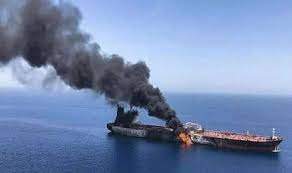IMO Calls Special Ukraine Meeting Amid Safety Fears For Ships
The International Maritime Organization (IMO) will convene a special meeting next week to discuss the risks to seafarers and ships in the Black Sea and Sea of Azov after Russia’s invasion of Ukraine, the UN’s shipping agency said on Friday.
Over 15 countries earlier this week called for an IMO meeting as concerns grow for the safety of ships and their crews amid ships being damaged by projectiles.

Many shipping firms have suspended sailings to affected Black Sea ports and other terminals in Ukraine. Insurance premiums for voyages have soared since Russia’s invasion on Feb. 24, an action Moscow calls a “special operation”.
An Estonian-owned cargo ship sank on Thursday off Ukraine’s major Black Sea port of Odessa, hours after a Bangladeshi vessel was hit by a missile or bomb at another port, killing one of its crew. This followed at least three other ships being hit by projectiles in recent days.
The IMO said the virtual meeting will be held on March 10 and 11 with its Council, which consists of 40 member countries who are elected for two years. Non-Council member states such as Ukraine will be able to make statements.
The IMO has 175 member states and three associate members and is tasked with safety and security of international shipping.
While it can adopt international laws to bolster safety at sea it cannot stop merchant ships from sailing to destinations.
The Marshall Islands, one of the world’s top flag states for shipping, raised its warning system to the highest level on Thursday for some stretches of water.
“Commercial vessels should not attempt to enter the Sea of Azov or the Northwest Black Sea,” it said in an advisory note, adding that multiple commercial vessels have been hit by missile attacks and shelling at or near Ukrainian ports and territorial waters.
On Wednesday, the International Transport Workers’ Federation union and other bodies designated sections of the Black Sea and the Sea of Azov as “warlike operations areas”, which entitles seafarers to refuse to sail to the region among other rights.
Estonian Cargo Ship Sinks After Possible Mine Strike Near Odesa
An Estonian-owned small cargo ship sunk in the Black Sea earlier today with conflicting reports that the vessel may have been struck by a mine or that Russian forces had commandeered the ship as they prepare for an amphibious assault on Odesa. Earlier reports of missing crew members have been revised by the Estonian Ministry of Foreign Affairs that later said all six crew members had been accounted for and were safe.
Helt, a 2,086 dwt cargo ship registered in Panama was reported to have been at anchor approximately 20 miles south of Odesa when the vessel was shaken by a large explosion. Crewmembers issued a “mayday” call on Channel 16 and abandon ship into a life raft. The crew reported that the vessel had taken on a 70-degree list with two crew in one raft and four others unaccounted for in the early reports.

Speaking to the ship manager, Vista Shipping Agency in Estonia Reuters reported that the vessel had sunk. Thursday afternoon, the Estonian Ministry of Foreign Affairs confirmed the incident saying the circumstances “are still not clear and it is not known exactly what caused the sinking.” The Ministry said all six crewmembers had been safely rescued.
Dryad Global is quoting a March 2 report from the State Border Guard Service of Ukraine “stating that Russian forces had taken the MV Helt hostage.” Reports however vary widely as to what exactly transpired. Some outlets are saying that Russian forces threatened the small cargo ship and drove it into an unsafe area which was believed to have been previously mined by the Russians. Others are saying that Russian forces were using the vessel’s AIS signal and it as cover as they positioned their forces for the assault on Odesa.
Reporting from Dryad says that the information they obtained stated that the vessel was fired upon and received a hole below the waterline. Images and reporting seem to indicate that the vessel struck a mine.
The incident comes hours after the northern half of the Black Sea and all the Sea of Azov was designated as “Warlike Operations Areas.” Yesterday, NATO issued a warning to all commercial shipping citing the previous attacks on merchant shipping during the first week of the war and warning that it was likely that sea lanes in the northern Black Sea had possibly been mined.
Warning of the risk of collateral damage in the north western Black Sea, NATO wrote in its alert, “Shipping is encouraged to stay well informed about these and keep well clear of the areas as well as warships and military crafts. It should always be taken into account that the situation may develop further during a voyage.”
This is believed to be the fifth merchant ship that has been caught in the crossfire of the war. Last week three vessels reported being hit with one small product tanker on fire. Yesterday, the first seafarer casualty was reported when a missile struck a Bangladeshi bulker killing the vessel’s third officer who was reportedly on watch at the time of the strike. The loss of Helt would be the first confirmed sinking of a merchant ship in the war on Ukraine.
Some Dockers’ Unions Are Beginning to Refuse Russian Cargoes
Kees Torn Boris Vilkitsky, named after a famed Russian explorer and built to serve a Russian LNG terminal, is not Russian-owned; she may be exempt from a British ban on Russian shipping (Kees Torn / CC BY SA 2.0))
The government of the United Kingdom has banned Russian-flagged and Russian-owned vessels from its ports, but it has yet to ban Russian cargoes – and this has unionized workers at the UK’s largest LNG terminal concerned.

The LNG carriers Boris Vilkitsky and Fedor Litke are headed for Grain LNG – the largest LNG import terminal in Europe – with plans to unload on Sunday, according to British labor union Unison. The union represents around 200 workers at the terminal, and its leaders are calling on UK transport secretary Grant Shapps to make a decision on whether to allow the arrival of Russian energy cargoes. Russia is the UK’s third-largest supplier of LNG.
“Grant Shapps must send these two ships packing. He needs to make it clear that all Russian ships are banned from every UK port and terminal,” said Unison head of energy Matt Lay in a statement. “The workers at the National Grid terminal don’t want to touch the cargo given the tragedy unfolding in Ukraine. These staff are determined to show their support for the Ukrainian people and uphold the sanctions imposed against Russia.”
The Boris Vilkitsky and Fedor Litke are both owned in Greece and flagged in Cyprus. Though Greek-operated, their namesakes and their commercial mission are uniquely Russian: they are icebreaking LNG carriers, purpose-built for lifting and delivering product from Novatek’s Yamal LNG facility in the Russian Arctic.
Novatek is not fully sanctioned, though its access to U.S. capital markets has been restricted since the Russian invasion of Crimea in 2014. Its activities may be further affected by new restrictions on the Russian banking sector, but the purchase of its product is not explicitly prohibited.
Since they remain legal, Russian LNG cargoes continue to trade on the open market – though sometimes at a lower price, according to Poten & Partners. “We’ve seen Russian cargoes selling at a discount in the spot market. We see some Western traders still dealing in Russian cargoes, but we have seen some Asian traders say that they will not be touching those cargoes,” said Jason Feer, global head of business intelligence for Poten & Partners, in a webinar Thursday. “There is a concern that it may be difficult to pay for shipping, even if payment for LNG is possible.”
Dockers’ refusal to handle Russian LNG is potentially significant for the Russian export economy, and other dockers’ unions are taking similar measures to show solidarity with Ukraine.
In the U.S., the International Longshore Workers’ Union (ILWU) – which handles collective bargaining for West Coast ports – announced Thursday that it will no longer work Russian cargoes or Russian vessels, inbound or outbound. “With this action in solidarity with the people of Ukraine, we send a strong message that we unequivocally condemn the Russian invasion,” said ILWU International President Willie Adams. “West Coast dockworkers are proud to do our part to join with those around the world who are bravely taking a stand and making sacrifices for the good of Ukraine.”
As a practical matter, the decision will have a relatively small impact on container traffic flow: Russian cargoes make up a fraction of a percentage point of the volume handled at LA/Long Beach, the main West Coast seaport. Bulk cargoes could also potentially be affected.
Kindly like us on Facebook















